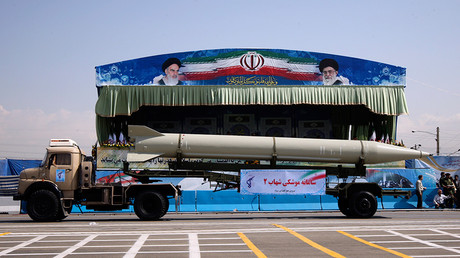Trump to seek changes to Iran nuclear deal, will waive sanctions ‘one last time’ – reports
Donald Trump will waive sanctions against Iran “one last time,” upholding Washington’s commitment to the landmark nuclear deal between Tehran and six world powers, multiple reports citing White House official say.
Trump, however, will demand an agreement with European partners and an amendment to US law on the Iran nuclear deal, according to senior White House officials cited by Reuters.
The reports follows a meeting between Trump and his national security advisers at the White House on Thursday.
The waiving of sanctions against Iran is part of the landmark nuclear deal agreed between Tehran and six world powers under the Obama administration in 2015. Trump has long been a critic of the agreement, previously dubbing it the “worst deal every negotiated.” The move to lift sanctions on Iran was made in exchange for Tehran curbing its nuclear program.
Ahead of Trump’s expected Friday announcement, Iran’s atomic energy had warned that it would take “necessary actions” if Trump were to re-impose sanctions, noting that it could speed up uranium enrichment.
“The American government should think wisely... even though they have shown until now unfortunately that they are not thinking or acting wisely,” Atomic Energy Organization of Iran spokesman Behrouz Kamalvandi told state TV earlier this week, as quoted by Reuters.
On Thursday, the EU and member states urged Trump not to withdraw form the agreement, with EU foreign policy chief Federica Mogherini saying the deal is “working” and “making the world safer.”
“It is delivering on its main goal, which means keeping the Iranian nuclear programme in check and under close surveillance,” she said during a joint press conference which included representatives from the European Union, the UK, France, and Germany.
Trump, who previously stressed that he could cancel US participation in the nuclear deal “at any time,”refused to re-certify Iran’s compliance with the deal in October. He claimed at the time that Iran had “committed multiple violations” of the nuclear deal, despite the International Atomic Energy Agency’s confirmation that the Islamic Republic was in compliance.
Responding to Trump’s decision at the time, Iranian President Hassan Rouhani said Tehran would not cave in to US pressure. One day later, Iranian Foreign Minister Mohammad Javad Zarif said Trump’s move undermined US credibility on the world stage.
Had Trump decided to re-impose sanctions on Iran, it would have been a violation of the nuclear deal. Some, including Iranian Deputy Foreign Minister Abbas Araghchi, had speculated that the agreement would have collapsed without US involvement.
The nuclear deal, also known as the Joint Comprehensive Plan of Action, was ratified in Vienna in July 2015. The agreement was reached between Tehran and the five permanent members of the UN Security Council – the US, China, France, Russia, and the UK – plus Germany.



